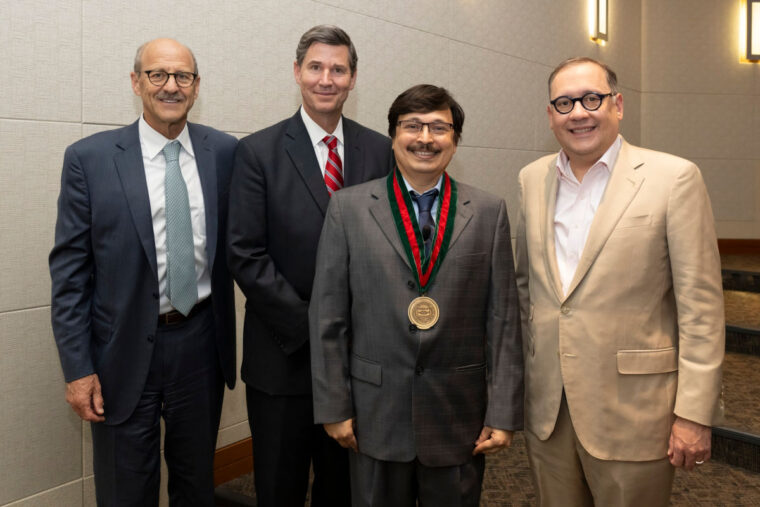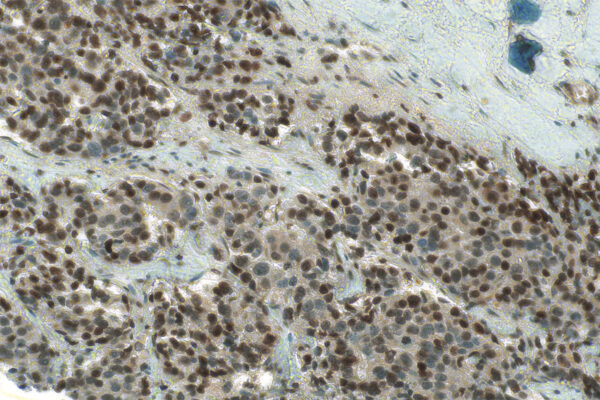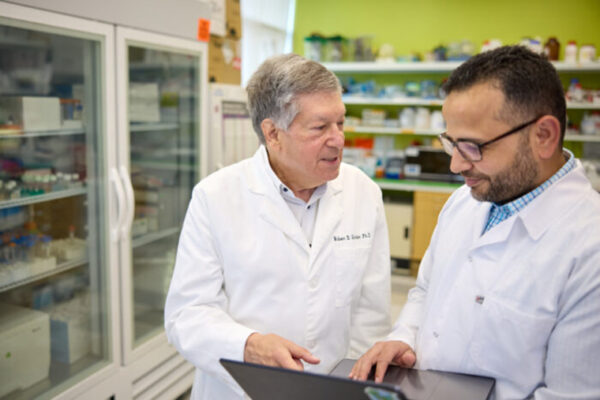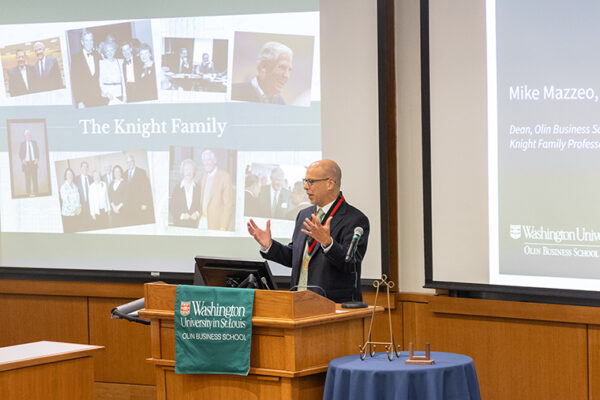Nupam Mahajan, a pioneering prostate cancer researcher, has been named the inaugural Urologic Surgery Research Professor at Washington University School of Medicine in St. Louis. Mahajan’s work has changed his field’s understanding of how prostate cancer progresses to become resistant to treatment and has advanced investigations into potential new treatments for prostate tumors.
The Urologic Surgery Research Professorship was established by the Department of Surgery to promote research aimed at improving clinical outcomes and broadening treatment options in the field of urology. Mahajan was installed by Chancellor Andrew D. Martin and David H. Perlmutter, MD, the George and Carol Bauer Dean of the School of Medicine, executive vice chancellor for medical affairs, and the Spencer T. and Ann W. Olin Distinguished Professor.
“Dr. Mahajan’s pioneering research is paving the way for innovative treatments geared to the many patients whose prostate tumors eventually develop resistance to hormone therapies,” Martin said. “There is a dire need to develop new therapies to help these patients, and this endowed professorship will help support critical studies to further this important translational research.”
Mahajan’s work occupies a significant place in our understanding of how prostate cancer develops and progresses. He was among the first to identify triggers at the cellular level that change how prostate cancer-linked genes are upregulated. Specifically, he showed how tyrosine kinases — proteins key to certain genetic signaling processes — can allow androgen receptors to be independent of testosterone and accelerate prostate cancer cell growth in patients receiving testosterone-reducing medications. With that information, Mahajan is working to develop targeted therapies to manipulate those mechanisms to suppress tumor growth while also bolstering the patient’s cancer-fighting immune response.
Mahajan hopes to test such therapies in clinical trials next year.
“Dr. Mahajan’s work on prostate cancer exemplifies how understanding the mechanisms underlying this cancer can be used to establish new therapeutic targets and move them forward into clinical application as quickly as possible,” Perlmutter said. “We look forward to continuing to see the results of Dr. Mahajan’s findings, probing the depths of basic science to put new innovations into practice for the benefit of patients.”
Mahajan, who joined the School of Medicine faculty in 2018, holds 10 patents derived from his work, almost all of which have been licensed for commercial development.
The new professorship is the latest in a number of honors for Mahajan, among them the Bankhead-Coley Award, the Movember-PCF Foundation Challenge Award and the Celgene Award. He also has received continuous RO1 funding from the National Cancer Institute of the National Institutes of Health (NIH).
“Nupam Mahajan is exactly the type of translationally focused researcher we want to support in the Department of Surgery, and it is our hope that his discoveries in particular will lead to better treatments for patients with prostate cancer,” said John A. Olson Jr., MD, PhD, the William K. Bixby Professor of Surgery and head of the Department of Surgery. “He also is generous with his time and expertise, and a great role model for trainees.”
Mahajan earned his PhD from the Indian Institute of Science in Bangalore and completed his postdoctoral studies at the University of North Carolina at Chapel Hill.
About Washington University School of Medicine
WashU Medicine is a global leader in academic medicine, including biomedical research, patient care and educational programs with 2,900 faculty. Its National Institutes of Health (NIH) research funding portfolio is the second largest among U.S. medical schools and has grown 56% in the last seven years. Together with institutional investment, WashU Medicine commits well over $1 billion annually to basic and clinical research innovation and training. Its faculty practice is consistently within the top five in the country, with more than 1,900 faculty physicians practicing at 130 locations and who are also the medical staffs of Barnes-Jewish and St. Louis Children’s hospitals of BJC HealthCare. WashU Medicine has a storied history in MD/PhD training, recently dedicated $100 million to scholarships and curriculum renewal for its medical students, and is home to top-notch training programs in every medical subspecialty as well as physical therapy, occupational therapy, and audiology and communications sciences.
Originally published on the School of Medicine website



